- Home
- Joseph Bruchac
Found Page 2
Found Read online
Page 2
Let Dead Eyes and whoever else might come looking for me follow this, he thought.
Then, taking great care to leave no signs of his passing, he walked back to the stream, balancing himself on top of stones. He stepped into the shallow water and began to go east. He passed again under the trestle, past the wide, flat boulder. Half an hour later, he left the water. The trestle was three turns in the little river behind him.
Nick looked over yet another smooth stone before sitting on it. No worries about poisonous snakes this far north, but there were still insects and spiders and centipedes to think about. And ants. Nick loved reading things about nature and memorizing them. The total weight of all the ants in the world was either equal to or more than the total weight of all the humans. Ants were on every continent except Antarctica, although there were cockroaches in the warm buildings humans placed there. None of the ants in Canada were really dangerous to people. They were not like the driver ants of the tropics—which could ooze acid out of their jaws—but being overly cautious was better than regretting being careless.
He unlaced his boots and slid them off. They weren’t new. Only an idiot or someone in love with blisters would set out on a journey in new boots. But they were sturdy and made of good leather that had been worn in, so those boots both fit snugly and gave where give was needed.
His socks seemed dry. The boots had not soaked through, and he’d been careful not to step into any deep places where the water would come over their tops. But just to make sure, he put the socks he’d just taken off into a side pouch in his pack. To cool off his feet, he sat barefoot for a few minutes before putting on the clean socks and his boots. He took the canteen from his pack and knelt by the stream. Facing the mouth of the canteen downstream, he filled it where the water was running swiftest over the rocks.
Then, compass in hand, he left the stream to head east through the forest.
Without a compass it might have been hard for some people to keep in a straight line. But Nick only glanced at it now and then. Mostly he used the method Grampa Elie had taught him. Line up four trees in a row at least a hundred yards apart. Then go from tree one to tree two to tree three to tree four. Look back, get your line, and then choose four more trees ahead of you.
Nick moved at an even pace. Not running, but not walking either.
It wasn’t hard to navigate through the tall trees—coast redwoods, most of them. They weren’t virgin timber. None of the trees were the giants that were here before white men started logging. But the last time this area had been cut had certainly been decades ago. The undergrowth was not difficult to get through. A natural fire— likely set off by lightning—had been through and burned up the smaller fallen limbs, the dry brush, and the berry bushes. So it was easy to get sight lines and to move without pushing through heavy undergrowth or, worse, blackberry tangles. Now and then there was a long, low hump grown over with moss across his way. It was all that was left of a big tree that had fallen a long time ago. Everything around him was shades of green and gray—old man’s beard moss hanging from the lower limbs, lichen on the bases of the tree roots. It wasn’t quite as moist as the northern rain-forest woodlands of the Pacific Coast where he’d spent days doing wilderness camping. But everything around him glowed with the kind of life that regular rains bring. There’d be no problem about finding drinkable water.
The land began to rise steeply in front of him. He was at the base of the first of the ridges shown on his map. After three hours of steady travel, he’d covered about seven miles. From here on, as he climbed, it would be slower.
And colder. The top of the ridge, perhaps a mile away, was white with snow.
Not a good idea to climb that ridge now. It was 7:00 p.m. by his watch, and the sun would be out of sight by the time he reached that ridgetop.
It had been a warm day—warm enough that he’d sweated a little as he’d jogged along. But he could already feel things starting to cool down. All of his heavier clothing was in the bag left behind on the train. He’d need to make a shelter for the night.
CHAPTER 5
Shelter
There was a small rise in front of Nick. It looked perfect. It was the kind of place that would not flood if there was a heavy rain. He walked to the top, where there was a level area about half the size of a small bedroom. He knelt and pressed his hand on the ground. The earth was dry.
He stood and faced first one direction and then another, making a circle as slowly as if he was doing tai chi. The air was still. No wind was blowing. But that could change at any minute. From west to east was the usual way the wind blew. He looked at the trees around him. The larger ones were spruce and fir trees—evergreens mixed with birch, beech, and maple. The taller evergreens were all bent near the top in the same direction. That was from being pushed by the wind. Pushed from west to east.
That meant he should build his shelter so that its opening faced the east. You don’t want the wind blowing into your face. Wind blowing in makes it hard to stay warm. Rain gets blown in too. And if you make a fire in front of your shelter, the choking smoke will be pushed inside. Plus, facing east means catching the first rays of the sun in the morning.
Always look up before you decide on a spot to stay.
Nick looked up as he turned in a circle the second time. No dead trees or limbs were close by his little hilltop. That was one of the dangers of spending the night in the woods. More than one person had gotten badly hurt or even died when a tree or a branch fell on them. It didn’t take that big of a branch, either. One the size of a baseball bat could break your limbs.
But there were lots of fallen branches of various sizes under nearby trees. Perfect sizes, in fact. He walked down off the rise and began to sort through them. He set aside three relatively straight and smooth poles and brought them back up to the hilltop. Two were about six feet long. The third was close to ten feet.
The earth itself would be his mattress. But he didn’t want to roll over in the night onto a sharp twig. So he set his lodge poles aside, knelt, and brushed the ground free of sticks and leaves where the floor of his lean-to would be. For a more permanent structure, he might have made a bed from green boughs and woven them together the way Cree people did when they set up hunting camps. That would make a springy, good-smelling floor that could be used for weeks. Now, though, for two reasons, that would not be a good idea. First, it would be wasteful. Sure, he’d thank any tree he cut a branch from. But why hurt a tree when he didn’t need to? Second, and more important, he wanted to leave as little trace of himself as possible.
Using some of the cord in his pack, he tied the two six-footers together at the top. Then he attached the third pole so they formed an A-frame, about four feet high in the front and sloping to the ground in the back. He used slipknots that would hold firm but be quick and easy to untie.
A Canada jay flew down to land on a branch overhead as he worked.
Wisakedjak, Nick thought. That’s what the Cree people call you.
The bird looked at Nick, staring at him with one eye. It was so comical that it made Nick laugh.
It kept looking at him.
All right, Nick thought.
He opened his pack and took out a few of the shelled nuts. Placing them on his right palm, he held his hand out toward the bird. It cocked its head and made a wheet-wheet call. Then it flew down and landed on his wrist. It picked up the nuts, one after another, before spreading its wings.
Nick felt some of the tension in his chest let go as the jay flew away. It was as if it had come to reassure him. In Cree stories, Wisakedjak was a trickster, but it was also a friend of humans.
I’m going to be okay, Nick thought as he went back down the hill to gather more branches, shorter ones this time.
Again, it didn’t take long before he had a large stack of dead limbs. He sorted them into two piles. The driest ones were for firewood. The others, straight sticks ranging from five or six feet to two feet in length, were for the framework.
There was still an hour before full dark would settle in. Time to make a fire.
CHAPTER 6
Fire
Nick scraped the leaves and needles off the ground in front of the opening to his shelter. He kept on doing this until he cleared everything away in the shape of a circle four feet wide. Using his knife, he cut up pieces of mossy earth, leaving a smaller circle of sand exposed for a fire pit. There were loose rocks around the hill next to him. He gathered a dozen and placed them around the fire pit. Not all the way around. He left the partial circle of stones open toward his shelter. Then he placed the pieces of mossy earth behind the rocks. They would help keep a fire from spreading.
Most important thing about a fire, Nosi, is to get it ready right.
Nick smiled to himself. Whenever he was getting set to make a fire, he’d always hear those words. Grampa Elie had first said them to him when Nick was only four years old.
He placed down several heavier sticks, each about a foot long, to make a base for the fire. He’d gathered some paper-dry bark from the birch trees, stripping it from dead fallen limbs. Perfect.
Birch, thank you, Nick thought as he tore the bark into strips that coiled as he tore them off. You covered our lodges. You gave yourself to make our canoes. You are one of our oldest friends.
The Abenaki name for “birch” means “blanket tree.” One of the stories Aunt Marge told him was about a little girl who had gotten lost in the woods. Her parents couldn’t find her, even though they looked and looked. It was getting cold and snow was starting. They were afraid she’d freeze. But the next morning, when they found her, she was just fine. She had wrapped a big piece of birch bark around herself and stayed warm.
After Nick had a big enough pile, he began propping up thin twigs in a tipi shape around the birch strips. Then he made a second layer of larger dry sticks over the twigs. Patiently and carefully, he built up his fire tipi until it was about eighteen inches high. Too big and a fire is wasteful or even dangerous.
Nick shook his head as he thought of the story he’d seen a year or two ago on his iPhone’s news feed. Some guy had tried to imitate something he’d seen on a TV show about forging your own sword. He’d made a huge fire in an oil barrel, and it got away from him. That fire ended up burning down a whole neighborhood, and the man ended up in jail.
Nick sat down cross-legged between the fire pit and his shelter. He knew a lot of ways to start a fire, ways that he was prepared to teach the campers at that school where he’d been heading. Fire plow, hand drill and bow drill, flint and steel, focusing the sunlight through a magnifying glass, and using a cigarette lighter or touching a 9-volt battery to steel wool. You could even— if you were really desperate or sick of hearing from telemarketers—cut into the side of your cell phone to expose the lithium battery, which would burst into flame when exposed to air.
Mentioning that last method always got a few horrified gasps from kids and some knowing smiles from grown-ups. But Nick had no intention of doing any of those things. He took the tightly sealed round pillbox out of one of the small plastic bags in his pack. He removed a single safety match and replaced the top on the pillbox, which he’d wrapped with striking paper. He leaned close to the fire tipi and reached in, striking the match next to the tinder. The birch bark lit right away with an almost smokeless flame. He’d left plenty of gaps between the piled sticks of the fire tipi so the fire was quickly getting all the air it needed. No need to blow on it as you do when starting your fire from a single coal packed with a bow drill and placed into a tinder bundle.
Nick sat back and stowed his matches in his pack, which he then placed behind him in the lean-to. The entire fire tipi was burning now. He’d done a good job selecting dry branches. He had wood placed around his fire pit to feed the fire after it was started. Enough wood to keep a small, warm fire going all night.
He began to put some of those larger pieces of wood onto the fire, crisscrossing them. He did that very carefully so he didn’t smother the flames.
Take care of a fire when it’s little, and it will take care of you when its big.
Some of the branches he’d gathered were thicker than his arm and six or eight feet long. He hadn’t bothered trying to break them up into smaller lengths. When the fire was hot enough, he put the ends of three of them into the fire. Now all he had to do was push them farther into the fire as they burned through the night.
The warmth of the fire felt good on his face. He was feeling thirsty, though. He uncapped his canteen and took a slow drink. He’d already put a water-purifying tablet into it. Even though he was fairly certain that the stream wasn’t contaminated, it was better to be safe than sorry. Even ponds and rivers far from so-called civilization often had microscopic organisms that caused beaver fever.
It was dark now. A few bright stars could be seen through the trees, but the moon had yet to show her face. The fire made him feel not just warm but also secure. It was an old way to feel, a way people had felt thousands and thousands of years ago when their fires protected them from the giant animals that hunted human beings back then.
Those huge bears and saber-toothed cats were long gone now. True, there were mountain lions and bears—maybe even some grizzlies—in this part of the continent. But those weren’t usually a danger. They tended to be more afraid of people than people needed to be afraid of them. And a fire would warn them off. There were wolves, but no Native person was ever worried about them. They were just big, wild canines, not that far removed from dogs. All those stories about wolves attacking people were folk tales from European people.
People, Nick thought. People are what’s most dangerous.
The image of the calm, brutal face of the man he thought of as Dead Eyes came back into his memory. A shiver went down his back. Then he pushed it aside, remembering again something Grampa Elie had said.
Don’t worry about what you can’t change. Just be prepared to do what you can when you need to do it.
He walked a few yards downwind and pried a shovel-shaped piece of wood from an old stump. He carefully dug a shallow pit latrine, an outdoor toilet, putting the dirt aside on top of a wide, flat piece of bark so that it could easily be put back into the hole.
Nick thought about a poem he’d read once by a Cherokee writer named Smoke Arnett. It spoke about how you can judge a creature by the amount of scat they leave behind for others to see.
When Nick was done, he filled the latrine back in, scattering leaves and twigs and needles on top of where the hole had been. He stepped back and nodded. It all blended in. No sign any human had been there. The old Cherokee poet would have been pleased.
Nick walked back to his fire. On his way, he used his knife to cut a green twig from a beech sapling and stripped the bark off it with his fingernail. Then he slid down in front of the fire. He put a few more pieces of wood into it and leaned forward, his elbows on his knees. He sat there for quite a while, just looking into the fire’s flames, enjoying the changing colors and dancing patterns, feeling the comfort of warmth and light.
You’re never alone when you have a fire.
The dark forest around him felt peaceful. But it wasn’t quiet. There was rustling in the leaves. Shrews and mice. And from the distance came the hoo-hoo, hoo-hoo-hoo call of a barred owl.
Nick reached into his pack to scoop a small handful of his trail mix from the bag. He picked out a few pieces of almond and tossed them out beyond the light of his fire.
“I share my food with you, little sisters and brothers,” he said in a soft voice.
He put the rest of the handful into his mouth and chewed it slowly, enjoying every bit of it, from the
sweetness of the chocolate to the crunchiness of the nuts. He took a gulp of water from his canteen, swishing it around in his mouth before swallowing. Then, after grinding the end of the beech twig between his molars, he used it as a brush to clean his teeth.
The stars were less bright now through the trees. The full moon’s calm face was up there, her gentle light filling the sky.
“Good night, Grandmother,” Nick whispered.
Then he slid into the lean-to. Using his tightly closed pack as a pillow, he lay back. Something stuck into the center of his back, probably a small stone that he’d somehow missed. Rather than trying to find it, he just rolled onto his side. Curled up facing the fire, he closed his eyes and slept.
CHAPTER 7
First Morning
Though he’d added wood twice during the night, Nick’s fire was out when he woke. It didn’t matter. It had kept him warm during the coolest part of the night. However, his head seemed a little stuffed up and his sense of smell seemed to have been dulled. Congested. Not from sleeping out, though. His throat had felt a little sore when he was on the train. Probably something he’d picked up from other people— one of those late-summer head colds.
Sometime, maybe later in the day, he’d have to find a pine tree. Pine needles steeped in boiling water make a great tea, one that’s good for colds and sore throats.
The first light of the sun was showing over the top of the ridge. The sounds of birdsong were echoing through the trees. Nick smiled. It was always good to be where what he heard was not city sounds, or any human noises at all—just the ancient, joyous dawn chorus welcoming a new day.
He wasn’t sure he recognized the voices of any of the unseen singers. Being from the northeast, he didn’t know many of the native birds found in this part of Canada. But he heard a warbling song that had to be from some sort of thrush. Swainson’s, maybe? It was followed by a clear whistling call, a sort of turr-teet tee-tee-tee tee-tee-tee tee-tee-tee that might be a white-throated sparrow.

 Peacemaker
Peacemaker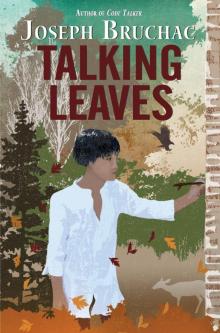 Talking Leaves
Talking Leaves Found
Found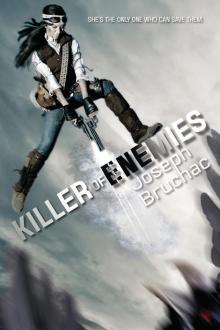 Killer of Enemies
Killer of Enemies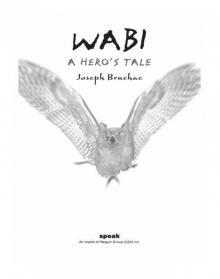 Wabi
Wabi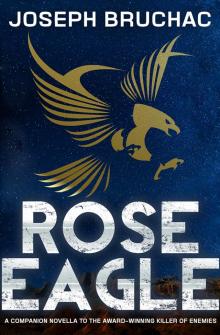 Rose Eagle
Rose Eagle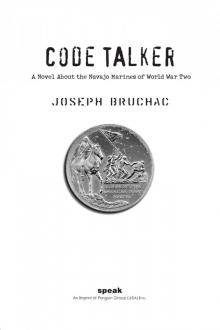 Code Talker
Code Talker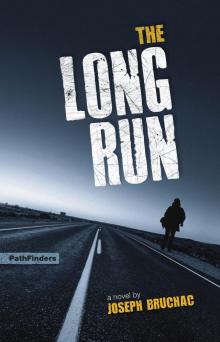 The Long Run
The Long Run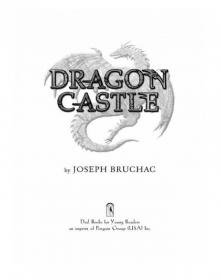 Dragon Castle
Dragon Castle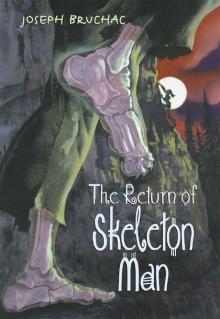 The Return of Skeleton Man
The Return of Skeleton Man Pocahontas
Pocahontas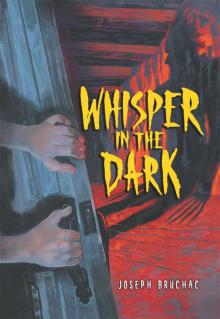 Whisper in the Dark
Whisper in the Dark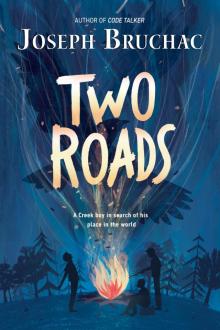 Two Roads
Two Roads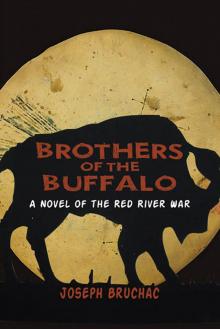 Brothers of the Buffalo
Brothers of the Buffalo The Warriors
The Warriors The Way
The Way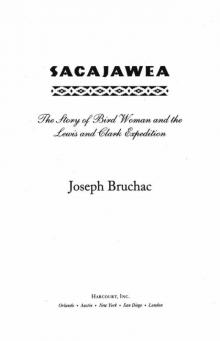 Sacajawea
Sacajawea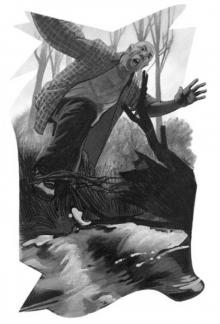 Night Wings
Night Wings March Toward the Thunder
March Toward the Thunder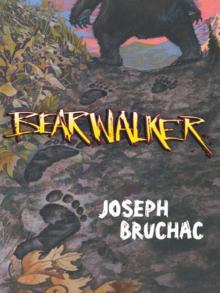 Bearwalker
Bearwalker Skeleton Man
Skeleton Man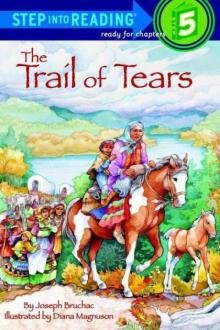 The Trail of Tears
The Trail of Tears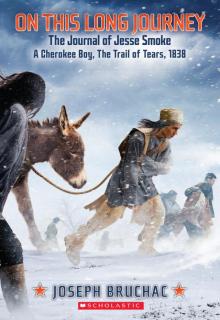 On This Long Journey
On This Long Journey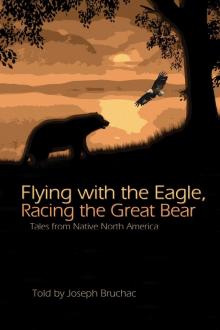 Flying with the Eagle, Racing the Great Bear
Flying with the Eagle, Racing the Great Bear